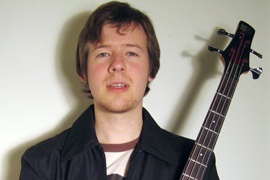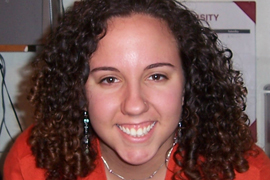Watson Fellowship Allows Seniors to Study Abroad
  |
| At left, Marlon Bishop 07 and Leigh Senderowicz 07 received Thomas J. Watson Foundation Fellowships, which facilitate independent projects abroad. |
| Posted 04/02/07 |
| Two Wesleyan students will have the opportunity to travel abroad and conduct independent studies as Thomas J. Watson Foundation Fellows.
Marlon Bishop 07 and Leigh Senderowicz 07 each received the $25,000 award. The Thomas J. Watson Foundation Fellowship provides graduating college seniors with a one year fellowship to explore an independent project outside of the United States, to enhance their capacity for resourcefulness, imagination, openness, and leadership and to foster their humane and effective participation in the world community. Approximately 195 students were nominated to be Watson Fellows; of these, only 50 were accepted. They come from 24 states and seven foreign countries. Louise Brown, associate dean of the college and campus liaison, nominated Bishop and Senderowicz. We are delighted that Marlon and Leigh will have this unequaled opportunity to experience learning on a global scale, Brown says. They will not only engage in a project about which they are passionate, but also experience the personal and intellectual stretch from undertaking an independent project in countries outside the United States. Being awarded seven fellowships over the past five years is a wonderful recognition of the intellect, creativity and character of Wesleyan students. Bishop will travel to the Dominican Republic, Honduras, Uruguay, Ecuador and Brazil for his study From Punta to Palos: Exploring the Hidden Afro-Latino Musics. Senderowicz will travel to Peru, Senegal, South Africa, Turkey for a study titled Taboo and Tolerance: Reproductive Health in Cultural Context. Bishop’s psroject comes from a personal musical connection to the African-derived musical styles of the United States, a great interest in Latin America and its cultural milieu, and a musicological education at Wesleyan. The Queens, N.Y. native started playing piano when he was 10, and started performing musical jams at the age of 14. Hes explored rock, American blues, soul, funk, jazz, classical and Afro-Cuban music, and at the age of 16, developed a fascination for Latin American culture and music during a visit to Peru. Bishop recalls playing his charango, a small Andean string instrument, and a group of teenagers with guitars and flutes came by, curious to see what a fair-haired gringo was doing with a local instrument. Though he only knew a handful of chords, it was enough to play along and he and the Peruvians spent the rest of the day playing. Though I spoke little Spanish at the time, I was able to communicate meaningfully with people who lived a world apart through music, Bishop says. The Watson year will take my personal, musical, and academic development to the next level, synthesizing the knowledge I have achieved into a single vision of the cultural processes that make music what it is. Senderowicz will look at how women’s health is affected by the laws of a nation, the dictates of culture, the directives of religion, the politics of international development organizations, and the values of the women themselves. Specifically, she will examine reproductive health choices by looking at the situation at each rung of the ladder as aid money travels from international organizations down to women seeking health care. She intends to talk with administrators, doctors, nurses, traditional health care practitioners, and most importantly, women seeking reproductive health care at non-governmental organizations and local health clinics. The biggest thing I hope to accomplish is gaining a sense of what my role in a broader global context should be, Senderowicz says. Im going to use this once-in-a-lifetime opportunity as a chance to re-engage and try to figure out where I can make positive interventions. The foundation selects its fellows by identifying individuals who demonstrate leadership, resourcefulness, imagination or vision, independence, integrity, responsibility and emotional maturity and courage. A candidate’s academic record, while not of primary importance, is also considered, together with those extracurricular activities that reflect both initiative and dedication. Watson Fellows must create, execute, and evaluate their own projects. Fellows set their agenda and decide how questions can be answered, when it is time to move on, if a project must be adjusted in any way. All fellows are required to maintain contact with the foundation during their year abroad, and submit a final evaluation. I’m very lucky not to have to jump into the grind of a career, and want to make the most possible out of this year, Bishop says. A year of travel, adventure, new sights and sounds, education, the joy of exploration of a little-studied subject. It all sounds like a great experience. |
| By Olivia Drake, The Wesleyan Connection editor |

